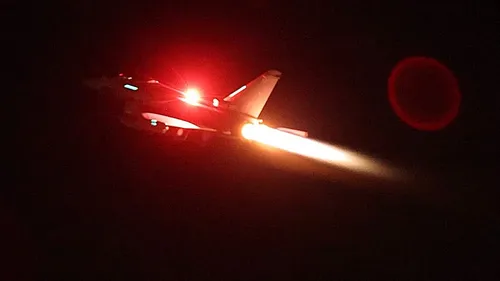
The United States and United Kingdom Armed Forces bombed a series of targets in Yemen last Thursday night (11), in response to attacks by Houthi rebels on commercial ships linked to Israel in the Red Sea, increasing fears that a larger war spreads in the Middle East.
The attacks were carried out jointly via sea and air, by submarines, warships and fighter jets, and according to US officials targeted Houthi air defense and coastal radar installations, as well as storage and launch sites for drones and missiles.
So far, there is talk of targets being hit in the country’s capital, Saná, and in the provinces of Sadá, Hodeida, Taiz and Dhamar. “These strikes are a direct response to the Houthi’s unprecedented attacks on international maritime vessels in the Red Sea – including the use of anti-ship ballistic missiles for the first time in history,” US President Joe Biden said in a statement. “I will not hesitate to take further action to protect our people and the free flow of international trade, as necessary,” added the president.
::South Africa formally accuses Israel of genocide and calls for an end to military operations on the first day of the trial in The Hague::
British Prime Minister Rishi Sunak said the United Kingdom had taken “limited, necessary and proportionate action in self-defence, together with the United States and with non-operational support from the Netherlands, Canada and Bahrain against targets linked to these attacks [a navios no Mar Vermelho]to degrade the military capability of the Houthis and protect global shipping.”
Ali al-Qahoum, a senior Houthi official, promised there would be retaliation for the bombings. “The battle will be greater, and beyond the imagination and expectation of the Americans and the British.”
Between October 31 and December 12 last year, the Houthis claimed a series of attacks on Israeli ships in the Red Sea, announcing that all ships associated with Israel would be considered legitimate targets. The rebels’ military actions in solidarity with Gaza have forced major shipping companies and other multinationals to redirect their shipping routes, avoiding the Red Sea and adopting a route through the Cape of Good Hope, in Africa. The impact of the actions is therefore considerable, as it is estimated that 12% of global trade and 1 trillion dollars worth of products pass through the Red Sea annually.
US congressmen protest Biden’s decision
Democratic and Republican representatives condemned on social media Biden’s decision to bomb Yemen without prior approval from Congress. “The president needs to report to Congress before launching an attack on the Houthis in Yemen and drawing us into another conflict in the Middle East. That’s Article I of the Constitution. I will defend that regardless of whether a Democrat or Republican is in the White House,” California Democratic Rep. Ro Khanna posted on X, the former Twitter. “Only Congress has the power to declare war,” Republican Rep. Thomas Massie of Kentucky posted.
::Process begins in The Hague: understand accusation of genocide against Israel for massacre in Gaza::
Democratic representatives Cori Bush, Val Hoyly, Mark Pocan, Pramila Jayapal and Rashida Tlaib also denounced that the bombings violated Article 1 of the US Constitution, according to the website Responsible Statecraft. On the Republican side, Senator Mike Lee and Representative Anna Paulina Luna also protested.
New regional war
The North American and British attacks come weeks after the United States announced the launch of the multinational military operation “Prosperity Guardian” on December 18 last year. The coalition, launched with the aim of responding to Houthi attacks in the Red Sea, includes twelve countries in addition to the US: the United Kingdom, Australia, Bahrain, Canada, Denmark, Germany, Greece, South Korea, the Netherlands, Norway, Singapore and Sri Lanka Lanka, and was already being pointed out by analysts as a factor that could lead to an expansion of Israel’s current war against Gaza into a regional war, encompassing several countries in the Middle East.
::Israel intensifies attacks in Syria and Lebanon and kills one of the Hezbollah commanders::
“By any reasonable estimate, confronting the Houthis would not result in a quick and agile military victory. The movement only became stronger after the nine-year war that Saudi Arabia and the Arab coalition it led waged against it, with generous military, diplomatic and intelligence support from the US, UK and other Western nations. The Iran-backed Houthis have also developed a considerable homegrown drone and missile capability, with a proven ability to target Saudi Arabia, the UAE United Arabs, Israel and Western military resources in the region,” Eldar Mamedov wrote in Responsible Statecraft this week.
“Therefore, no war against the Houthis would be limited to a few surgical strikes. With the foreseeable failure of such strikes to ‘neutralize’ the militia, there is a high probability of a misdirection that would lead the coalition to attack targets on the ground in Yemen, which in turn could lead to an indirect collision with Iran.”
Source: www.brasildefato.com.br

